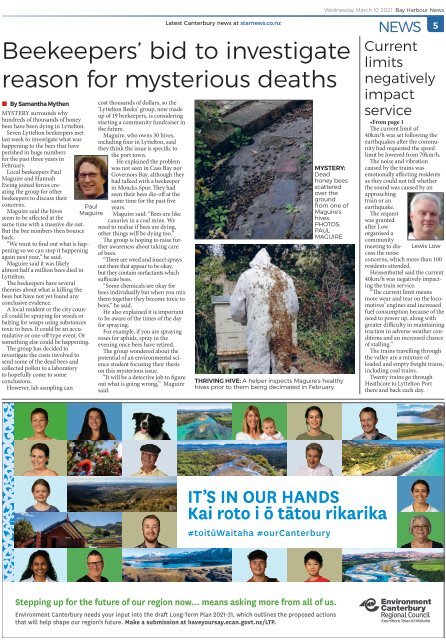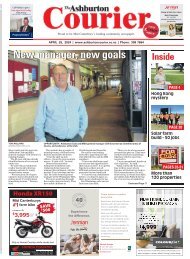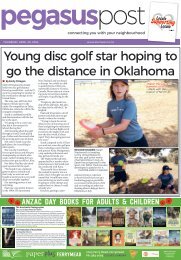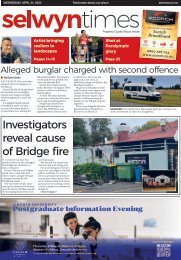Bay Harbour: March 10, 2021
Create successful ePaper yourself
Turn your PDF publications into a flip-book with our unique Google optimized e-Paper software.
Wednesday <strong>March</strong> <strong>10</strong> <strong>2021</strong> <strong>Bay</strong> <strong>Harbour</strong> News<br />
• By Samantha Mythen<br />
MYSTERY surrounds why<br />
hundreds of thousands of honey<br />
bees have been dying in Lyttelton.<br />
Seven Lyttelton beekeepers met<br />
last week to investigate what was<br />
happening to the bees that have<br />
perished in huge numbers<br />
for the past three years in<br />
February.<br />
Local beekeepers Paul<br />
Maguire and Hannah<br />
Ewing joined forces creating<br />
the group for other<br />
beekeepers to discuss their<br />
concerns.<br />
Maguire said the hives<br />
seem to be affected at the<br />
same time with a massive die out.<br />
But the bee numbers then bounce<br />
back.<br />
“We want to find out what is happening<br />
so we can stop it happening<br />
again next year,” he said.<br />
Maguire said it was likely<br />
almost half a million bees died in<br />
Lyttelton.<br />
The beekeepers have several<br />
theories about what is killing the<br />
bees but have not yet found any<br />
conclusive evidence.<br />
A local resident or the city council<br />
could be spraying for weeds or<br />
baiting for wasps using substances<br />
toxic to bees. It could be an accumulative<br />
or one-off type event. Or<br />
something else could be happening.<br />
The group has decided to<br />
investigate the costs involved to<br />
send some of the dead bees and<br />
collected pollen to a laboratory<br />
to hopefully come to some<br />
conclusions.<br />
However, lab sampling can<br />
cost thousands of dollars, so the<br />
‘Lyttelton Beeks’ group, now made<br />
up of 19 beekeepers, is considering<br />
starting a community fundraiser in<br />
the future.<br />
Maguire, who owns 30 hives,<br />
including four in Lyttelton, said<br />
they think the issue is specific to<br />
the port town.<br />
He explained the problem<br />
was not seen in Cass <strong>Bay</strong> nor<br />
Governors <strong>Bay</strong>, although they<br />
had talked with a beekeeper<br />
in Moncks Spur. They had<br />
seen their bees die-off at the<br />
same time for the past five<br />
years.<br />
Maguire said: “Bees are like<br />
canaries in a coal mine. We<br />
need to realise if bees are dying,<br />
other things will be dying too.”<br />
The group is hoping to raise further<br />
awareness about taking care<br />
of bees.<br />
“There are weed and insect sprays<br />
out there that appear to be okay,<br />
but they contain surfactants which<br />
suffocate bees.<br />
“Some chemicals are okay for<br />
bees individually but when you mix<br />
them together they become toxic to<br />
bees,” he said.<br />
He also explained it is important<br />
to be aware of the times of the day<br />
for spraying.<br />
For example, if you are spraying<br />
roses for aphids, spray in the<br />
evening once bees have retired.<br />
The group wondered about the<br />
potential of an environmental science<br />
student focusing their thesis<br />
on this mysterious issue.<br />
“It will be a detective job to figure<br />
out what is going wrong,” Maguire<br />
said.<br />
Latest Canterbury news at starnews.co.nz<br />
Beekeepers’ bid to investigate<br />
reason for mysterious deaths<br />
Paul<br />
Maguire<br />
MYSTERY:<br />
Dead<br />
honey bees<br />
scattered<br />
over the<br />
ground<br />
from one of<br />
Maguire’s<br />
hives.<br />
PHOTOS:<br />
PAUL<br />
MAGUIRE <br />
THRIVING HIVE: A helper inspects Maguire’s healthy<br />
hives prior to them being decimated in February.<br />
NEWS 5<br />
Current<br />
limits<br />
negatively<br />
impact<br />
service<br />
•From page 1<br />
The current limit of<br />
40km/h was set following the<br />
earthquakes after the community<br />
had requested the speed<br />
limit be lowered from 70km/h.<br />
The noise and vibration<br />
caused by the trains was<br />
emotionally affecting residents<br />
as they could not tell whether<br />
the sound was caused by an<br />
approaching<br />
train or an<br />
earthquake.<br />
The request<br />
was granted<br />
after Low<br />
organised a<br />
community<br />
meeting to discuss<br />
the noise<br />
Lewis Low<br />
concerns, which more than <strong>10</strong>0<br />
residents attended.<br />
Heissenbuttel said the current<br />
40km/h was negatively impacting<br />
the train service.<br />
“The current limit means<br />
more wear and tear on the locomotives’<br />
engines and increased<br />
fuel consumption because of the<br />
need to power up, along with<br />
greater difficulty in maintaining<br />
traction in adverse weather conditions<br />
and an increased chance<br />
of stalling.”<br />
The trains travelling through<br />
the valley are a mixture of<br />
loaded and empty freight trains,<br />
including coal trains.<br />
Twenty trains go through<br />
Heathcote to Lyttelton Port<br />
there and back each day.<br />
IT’S IN OUR HANDS<br />
Kai roto i ō tātou rikarika<br />
#toitūWaitaha #ourCanterbury<br />
Stepping up for the future of our region now… means asking more from all of us.<br />
Environment Canterbury needs your input into the draft Long-Term Plan <strong>2021</strong>-31, which outlines the proposed actions<br />
that will help shape our region’s future. Make a submission at haveyoursay.ecan.govt.nz/LTP.


















